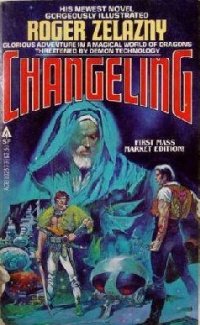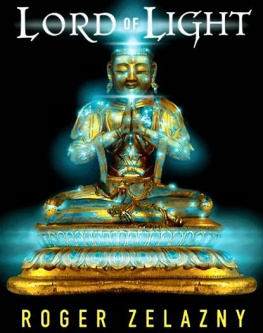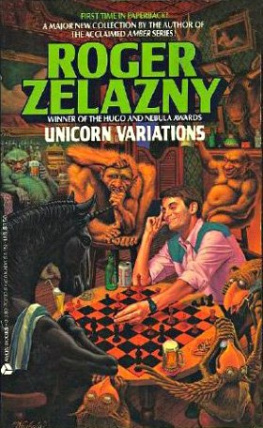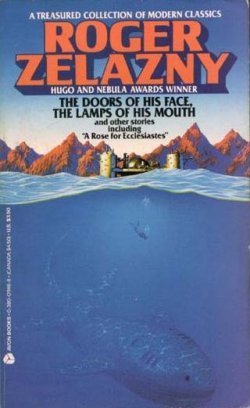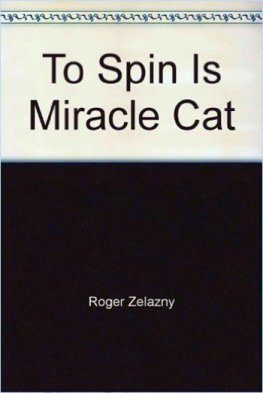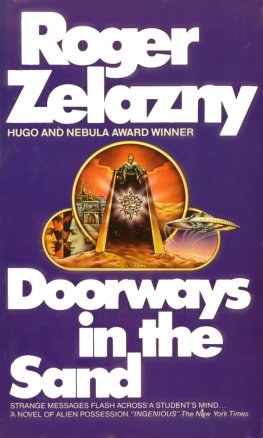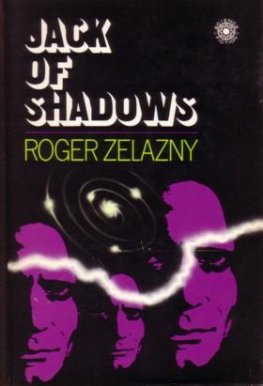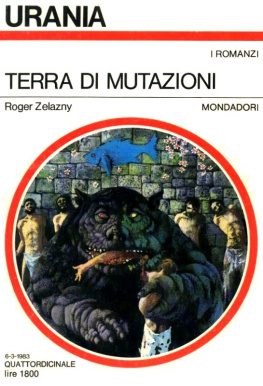Roger Zelazny - Dismal Light
Here you can read online Roger Zelazny - Dismal Light full text of the book (entire story) in english for free. Download pdf and epub, get meaning, cover and reviews about this ebook. genre: Science fiction. Description of the work, (preface) as well as reviews are available. Best literature library LitArk.com created for fans of good reading and offers a wide selection of genres:
Romance novel
Science fiction
Adventure
Detective
Science
History
Home and family
Prose
Art
Politics
Computer
Non-fiction
Religion
Business
Children
Humor
Choose a favorite category and find really read worthwhile books. Enjoy immersion in the world of imagination, feel the emotions of the characters or learn something new for yourself, make an fascinating discovery.

- Book:Dismal Light
- Author:
- Genre:
- Rating:4 / 5
- Favourites:Add to favourites
- Your mark:
- 80
- 1
- 2
- 3
- 4
- 5
Dismal Light: summary, description and annotation
We offer to read an annotation, description, summary or preface (depends on what the author of the book "Dismal Light" wrote himself). If you haven't found the necessary information about the book — write in the comments, we will try to find it.
Dismal Light — read online for free the complete book (whole text) full work
Below is the text of the book, divided by pages. System saving the place of the last page read, allows you to conveniently read the book "Dismal Light" online for free, without having to search again every time where you left off. Put a bookmark, and you can go to the page where you finished reading at any time.
Font size:
Interval:
Bookmark:
Roger Zelazny
Dismal Light
Right there on his right shoulder, like a general, Orion wears a star. (He wears another in his left armpit; but, for the sake of wholesome similes, forget it.)
Magnitude 0.7 as seen from the Earth, with an absolute magnitude 4.1; it was red and variable and a supergiant of an insignia; a class M job approximately 270 light-years removed from Earth, with a surface temperature of around 5,500 degrees Fahrenheit; and if you'd looked closely, through one of those little glass tents, you'd have seen that there was some titanium oxide present.
It must have been with a certain pride that General Orion wore the thing, because it had left the main sequence so long ago and because it was such a very, very big star, and because the military mind is like that.
Betelgeuse, that's the name of the star.
Now, once upon a time, circling at a great distance about that monstrous red pride of Orion, moving through a year much longer than a human lifetime, there was a dirty, dead hunk of rock that hardly anyone cared to dignify to the extent of calling it a world. Hardly anyone, I say. Governments move and think in strange ways, though. Take Earth for an example ...
It was decided - whenever big organizations don't want to blame a particular person, they tend to get all objective and throw "it" around like mad - it was decided that because of the shortage of useful worlds, maybe that hunk of rock could be made to pay off somehow.
So they got in touch with Francis Sandow and asked him if it could be done, and he told them, "Yes."
Then they asked him how much it would cost, and he told them that too, and they threw up their hands, then reached to close their briefcases.
But, aside from being the only human worldscraper in the business, Sandow did not become one of the wealthiest men around because of inheritance or luck. He made them a proposal, and they bought it, and that's how Dismal was born.
Now let me tell you about Dismal, the only habitable world in the Betelgeuse system.
A scant improvement over the bare hunk of rock, that's Dismal. Sandow forced an atmosphere upon it, against its dead will, an atmosphere full of ammonia and methane. Then he did frightening things to it, involving hydrogen and carbon; and the storms began. He had a way of accelerating things, and Earth's physicists warned him that if he didn't watch it, he'd have an asteroid belt on his hands. He told them, I understand, that if that happened, he'd put them back together again and start over - but that it wouldn't happen.
He was right of course.
When the storms subsided, he had seas. Then he stoked the world's interior, and amidst cataclysms he shaped the land masses. He did various things to the land and the seas, purged the atmosphere, turned off the Krakatoas, calmed the earthquakes. Then he imported and mutated plants and animals that grew and bred like mad, gave them a few years, tampered again with the atmosphere, gave them a few more, tampered again, and so on - maybe a dozen times. Then he set about screwing up the weather.
Then one day, he took some officials down to the surface of the world, whipped off his oxygen helmet, raised an umbrella above him, took a deep breath and said, "This is good. Pay me," before he started coughing.
And they agreed that it was good, and this thing was done, and the government was happy for a time. So was Sandow.
Why was everybody happy, for a time? Because Sandow had made them a mean sonofabitch of a world, which was what they'd both wanted, for various reasons, that's why.
Why only for a time? There's the rub, as you'll see by and by.
On most habitable worlds, there are some places that are somewhat pleasant.
There are some small islands of relief from bitter winters, stiffing summers, hurricanes, hail, tidal waves, terrific electrical storms, mosquitos, mud, ice, and all the rest of those little things that have prompted philosophers to concede that life is not without a certain measure of misery.
Not so Dismal.
You'd hardly ever see Betelgeuse, because of the cloud cover; and when you did see it you'd wish you didn't, because of the heat. Deserts, icefields and jungles, perpetual storms, temperature extremes and bad winds - you faced various combinations of these wherever you went on Dismal, which is the reason for its name. There was no island of relief, no place that was pleasant.
Why had Earth hired Sandow to create this hell?
Well, criminals must be rehabilitated, granted. But there has always been a certain punitive tenor to the thing, also. A convicted felon is currently granted a certain measure of distasteful experience along with his therapy, to make it stick - I gues - to the hide as well as the psyche.
Dismal was a prison world.
Five years was the maximum sentence on Dismal. Mine was three. Despite everything I've just said, you could get used to the place. I mean, the housing was good - air-conditioned or well insulated and heated, as necessary - and you were free to come and go as you would; you were welcome to bring your family along, or acquire one; and you could even make money. There were plenty of jobs available, and there were stores, theaters, churches and just about anything else you could find on any other world, though a lot sturdier in structure and often even underground. Or you could just sit around and brood if you wanted.
You'd still be fed. The only difference between Dismal and any other world was that you couldn't leave until your sentence was up. There were approximately three hundred thousand persons on the entire planet, of which probably ninety-seven percent were prisoners and their families. I didn't have a family, but that's beside the point. Or maybe it isn't. I don't know. I was part of one once.
There was a garden where I worked, all alone except for the robots. It was half underwater all the time and all underwater half the time. It was down in a valley, high trees on the crests of the hills above, and I lived there in a shiny watertight quonset with a small lab and a computer, and I'd go out barefoot and in shorts or in underwater gear, depending on the time, and I'd random harvest my crops and reseed the garden, and I hated it at first.
In the morning it would sometimes look as if the world had gone away and I was adrift in Limbo. Then the emptiness would resolve itself into simple fog, then into reptiles of mist, which would slither away and leave me with another day.
As I said, I hated it at first; but as I also said, you could get used to the place. I did, maybe because I got interested in my project.
That's why I didn't give a damn about the cry, "Iron!" when I heard it, partly.
I had a project.
Earth couldn't - strike that - wouldn't pay Sandow's rates when it came to building them a world miserable enough to serve either as a prison or a basic-training site for the military. So Sandow made his proposal, and that was what decided the destiny of Dismal. He gave them a cut rate and guaranteed plenty of therapeutic employment. He controlled so many of the industries, you see.
Laboratories are all right, I guess, for just simply testing equipment. You get all sorts of interesting figures concerning stress limits, temperature resistance, things like that. Then you turn a product loose in the field, and something you hadn't thought to test for goes wrong. I guess Sandow had had this happen to him lots of times, which is why he'd decided to pick up a piece of the field and add it to his lab facilities.
Dismal, all full of vicissitudes, was the testing ground for countless things.
Some guys just drove vehicles back and forth through different climate belts, listing everything that went wrong. All the fancy, sturdy dwellings I mentioned were test items also, and their counterparts will doubtless one day spring up on other worlds. You name it, and somebody was living with it on Dismal. Mine was food.
Font size:
Interval:
Bookmark:
Similar books «Dismal Light»
Look at similar books to Dismal Light. We have selected literature similar in name and meaning in the hope of providing readers with more options to find new, interesting, not yet read works.
Discussion, reviews of the book Dismal Light and just readers' own opinions. Leave your comments, write what you think about the work, its meaning or the main characters. Specify what exactly you liked and what you didn't like, and why you think so.

